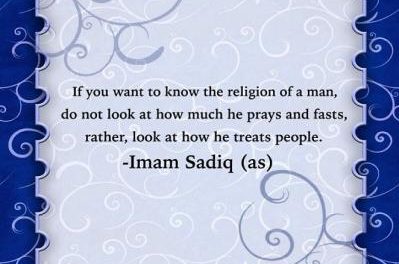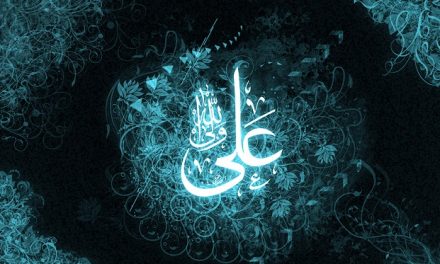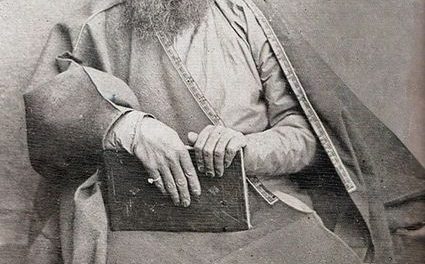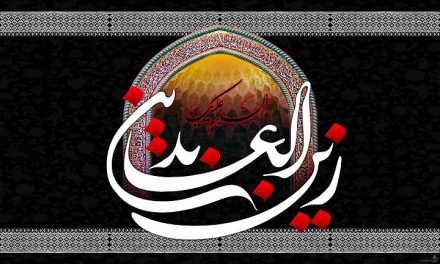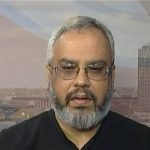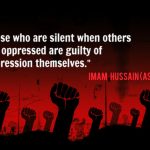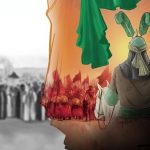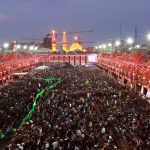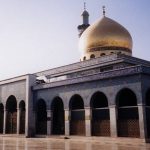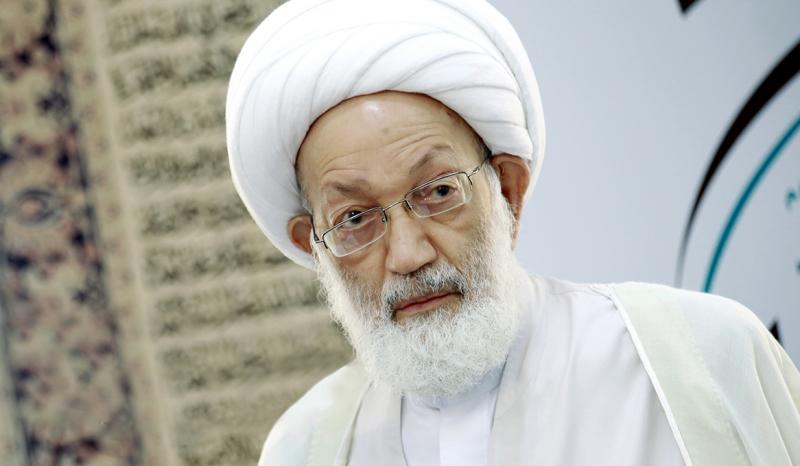
Ayatollah Sheikh Isa Ahmed Qassim is Bahrain’s leading Shia cleric and a politician. He is the spiritual leader of Al Wefaq, Bahrain’s biggest opposition society. He was the leader and is the founders of Islamic Enlightenment institution.
Sheikh Isa Qassim was born in 1937 to a fisherman in Diraz, Manama. Because of the Iranian origins of Qassim’s family, he didn’t obtain Bahraini citizenship until 1962, and it was several years after that that his own offspring were granted Bahraini citizenship.
During his academic study Isa Qassim went to Noaim at night to study Islamic teachings under sheikh Abdul-Hussain Al-Heli (Died in 1957). In 1962 Qassim began studies at the Najaf Religious Institute in Iraq, where he studied under many Marja’s including Mohammad Baqir al-Sadr. He remained in Al-Najaf for 4 years then returned to Bahrain where he worked as a teacher in Al-Khamis intermediate school for 2 years before returning to Al-Najaf. In Al-Najaf he met with other Shia Bahraini scholars including: Sheikh Abdul Amir al-Jamri, Sheikh Abdulla Al-Guraifi, Sheikh Abdulla Al-Madani and Sheikh Abbas Al-Rayes. All of them were from the same generation and knew each other well even before going to Al-Najaf, due to being partners as students or teachers.
When Bahrain declared its independence in 1971, one of the first challenges was to produce a Constitution and establish an elected Parliament.
As only a small number of religious figures at that time had benefitted from further education, Isa Qassim was singled out by the clerical establishment as a candidate for the Constitutional Assembly elections.
However, Isa Qassim was still pursuing his studies in Al-Najaf and declared that he preferred to continue his education – until his brother travelled to Iraq, four days before candidates registration closed and personally ensured that Isa Qassim and his family returned to Bahrain.
Shaikh Qassim was successful in these elections and as one of the 22 elected delegates is reported to have played a major role in ensuring emphasis on Islamic Shari’ah in the new Constitution. The Constitution also provided for a single-chambered Parliament, the National Assembly, with 30 elected members.
To contest the 1973 National Assembly elections, Qassim, along with his Al-Najaf colleagues, Al-Rayyis, Al-Jamri, Al-Madani and others formed the Religious Bloc, with the institutional support of Qassim’s Islamic Enlightenment Society.
In the National Assembly elections, these Da’wah members played a major role in influencing Shia communities away from nationalist and left-wing groups.
As a result of this intense activity, a high proportion of the candidates put forward for these elections were from Diraz, educated in Al-Najaf and associated with the Al-Da’wah movement. During the 12 December elections Qassim won more votes than any other candidate in the contest (1,079) and entered Parliament.
Sheikh Isa Qassim’s Islamic Enlightenment Society supported the 1979 Islamic revolution in Iran materially and spiritually and its success provided a stimulus to their own political activities.
Before the start of Iran’s Islamic revolution, the leaders of the Islamic Enlightenment Society initiated their first communications with Ayatollah Khomeini in Al-Najaf where many of these clerics had studied.
After the revolution succeeded, Qassim’s Society sent a telegram congratulating Imam Khomeini and expressing their support for the revolution and Islamic rule. A delegation from the Bahrain Shia Islamist movement also visited Tehran.
Shaikh Qassim travelled to Qom in 1991 to continue his studies towards Ayatollah status. Qassim studied under Ayatollah Fazel Lankarani, Ayatollah Seyyed Mahmoud Hashemi and Ayatollah Sayed Kazem Haeri.
In March 2001, he finished his studies, gained the title of Ayatollah and returned to Bahrain on March 8, 2001. Isa Qassim has been leading Friday Sermon in Duraz mosque since his return to Bahrain in 2001. Thousands of worshipers attend this sermon weekly. During the first speech preceding prayer, Qassim usually speaks about religious topics. And about political topics during the second speech.
Al-Wefaq Islamic Society was founded in 2001 when many Islamic opposition figures including Isa Qassim returned from exile and others came out of jail.
Shaikh Ali Salman became the organization’s secretary-general. The spiritual leader of Al-Wefaq was Ayatollah Isa Qassim. Qassim reestablished the Islamic Scholars Council, which regularly mobilized political support for Al-Wefaq at election time by describing them as “the Bloc of Believers”.
At the beginning of the 2011 unrest, Ayatollah Isa Qassim was seen as one of the figures advocating rallies against the oppressive regime and Al-Wefaq accordingly withdrew from Parliament.
Sermons by leading clerics were often thinly-veiled calls for mobilizing supporters against the corrupted regime. In early 2012 Ayatollah Isa Qassim gave a notorious sermon in which he called his supporters to “crush” the oppression of police.
Ayatollah Isa Qassim proved more effective than grassroots leaders in bringing out supporters onto the streets, notably in a bout of major protests in March 2012. A few months later, following a routine search of Qassim’s home by police, thousands of protesters came out onto the streets, declaring that “Isa Qassim is a red line”.
A typical Shaikh Qassim speech from that period declared: “The ruling Al Khalifa regime violates people’s rights, its legal system issues oppressive rulings for detainees and the regime’s mercenaries kill the young and old, the selection of Bahrain as the headquarters of the Arab human rights court is an inhumane act that amounts to a cover-up of the regime’s offenses and crimes.”
A special ceremony held in Tehran to honour Ayatollah Isa Qassim in April 2014 declared him to be the “Messiah of Bahrain”.
In 14 June 2016 Bahraini regime announced that Al-Wefaq Islamic Society would be closed down. On the same day, Ayatollah Qassim’s Islamic Enlightenment Society was closed down. A week later on 20 June, it was announced that Ayatollah Qassim’s citizenship would be withdrawn.
Today Ayatollah Qassim has the largest popular base in the country. He is considered by the popular majority in Bahrain as their leader and has many national positions.
Source: kerbela.info

